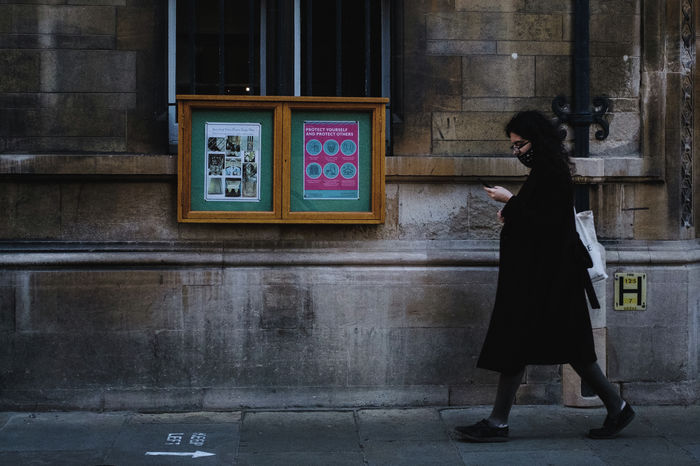University announces delayed return for Lent Term
The majority of students will not be expected to return until January 25th, with prior teaching taking place online

The University has announced that the majority of students will not be permitted to return until January 25th, with “an earlier return” only permitted for specific students. All teaching, which is due to begin on January 21st, will be delivered online until then.
International students whose plans cannot be rearranged “for reasons including the cost of rearranging travel” will be permitted to return to Cambridge as planned.
Further exemptions to the guidance includes PGCE students who are “ returning for placements,” students “without access to appropriate study spaces or facilities” or those with “specific reasons,” including “health-related reasons.” An email from Downing College seen by Varsity specifies that this includes “mental health issues.”
Part 1A and 1B medicine and veterinary medicine students have also received confirmation via email that they will return to Cambridge early, with teaching beginning on January 19th for these students.
In the email from the University, which was sent to students earlier today (31/12), Vice-Chancellor Stephen Toope acknowledged that the change “is potentially disruptive and difficult to students,” and added that this is one of the ways in which we “will have to adjust to the fast-changing circumstances of the pandemic.”
He also added that the date of January 25th “will be subject to review by the government,” meaning there is potential for “guidance changes.” In an email seen by Varsity, Queens' College warned students that arrangements “may well change at short notice.”
Postgraduate research students (PGR) who “need to be in Cambridge for their research projects” will be able to return, but the University “strongly encourage[s] this group of students not to do so before the week of the 11 January, when asymptomatic testing will restart.”
Students who are already in Cambridge “should remain in Cambridge,” and the email adds that “some college and University facilities and support will be available” for students returning prior to January 25th.
This comes after Education Secretary Gavin Williamson announced in the House of Commons yesterday (30/12) that universities should reduce the number of students returning in January, with students on practical courses taking priority.
In accordance with government guidance that students should be offered two rapid lateral flow tests before returning to campus, the University will offer individual tests from January 11th, and pooled testing from January 18th.
This follows previous government guidance that Higher Education providers should allow students on practical courses to return from 4th to 18th January, with providers required to decide which students to allow to return first based on a number of factors including work, clinical or practical placements, courses requiring practical teaching or learning, and courses requiring access to specialist or technical equipment.
Under the initial guidance, students on non-practical courses would then return gradually over a two-week period from 25th January.
After Williamson’s speech, a subsequent letter from Michelle Donelan, the Minister of State for Universities, confirmed that in light of “the rising infections rates, the return of all other students [those studying non-practical courses] should be paused until at least the week commencing 25 January.”
Meanwhile, the University and College Union (UCU) has taken issue with the Government’s latest plans to pursue in-person teaching.
Responding to Williamson’s announcement, UCU General Secretary Jo Grady argued against giving students lateral flow tests before returning to campus, claiming that such testing “miss[es] an alarming number of people with Covid.”
Grady said: “We now seem to be hurtling towards a national disaster, with the NHS about to be overwhelmed, but the government is wedded to using lateral flow tests to get students back onto campuses.”
“Keeping learning online until Easter would help lower rates of transmission and ensure a consistent learning experience, but the government continues to be fixated on forcing students and staff into lecture theatres and classrooms [...] We will have another term of students being forced in and out of isolation and staff being put at risk while their teaching plans are constantly disrupted.”
The Cambridge SU Class Act Campaign also released a Facebook statement yesterday (30/12) on “Tier 4 and Accommodation”, supporting the rights of “any student who self-declares as needing to reside in Cambridge due to a lack of safe or suitable alternative; for safety, mental health or medical reasons; or for any other reason self-certified as appropriate’ to be “accommodated by the University.”
The statement also adds that “students should not be financially penalised for circumstances that are not within their control”, and offered support from committee members as part of its commitment to create “a community of care and compassion.”
Health Secretary Matt Hancock also announced in the House of Commons yesterday (30/12) that further areas, such as Northamptonshire, Leicestershire, Lincolnshire, and Nottingham and Nottinghamshire would all be moving into Tier 4 from today (31/12), meaning that roughly three quarters of England has now been placed under Tier 4 restrictions, with all areas of the country now under at least Tier 3 restrictions.
A further 55,892 Covid-19 cases have been reported in the UK today (31/12), with 964 daily deaths.
 News / Under 3% of applicants for Cambridge academic jobs are successful7 April 2025
News / Under 3% of applicants for Cambridge academic jobs are successful7 April 2025 Features / Cambridge: where toxic productivity turns rest into a radical act8 April 2025
Features / Cambridge: where toxic productivity turns rest into a radical act8 April 2025 News / Rowing row continues as Oxford and Cambridge scrap women’s trial race9 April 2025
News / Rowing row continues as Oxford and Cambridge scrap women’s trial race9 April 2025 Sport / Previewing the 170th Boat Race7 April 2025
Sport / Previewing the 170th Boat Race7 April 2025 Comment / Cambridge’s gossip culture is a double-edged sword7 April 2025
Comment / Cambridge’s gossip culture is a double-edged sword7 April 2025






